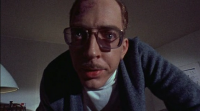
Sisters (Movie Review)
The opening scene of Brian DePalma's early Hitchcock homage “Sisters” sets the tone of voyeurism and misdirection that runs throughout the film. A man is getting dressed in a gym changing room as a blind woman (played by Margot Kidder) enters and begins getting undressed. The man notices the woman and slowly approaches her as the strings on the score build into a shriek. Just as it seems as though something sinister is about to happen, the image shrinks in a corny keyhole graphic and it’s revealed that we’ve been watching a Candid Camera-style 1970s game show called “Peeping Toms”. The “blind” woman is a French Canadian actress named Danielle and the man, Phillip, is actually a hapless target of the show’s hidden cameras. Both leave with some lovely parting gifts.
After taping the show, the two head off together for a drink which ends with a late night soiree at Danielle’s apartment. The next morning, Phillip learns that not only does Danielle have a twin sister named Dominique living in the back bedroom, but that today is their birthday. Phillip decides to walk around the block to pick up a birthday cake with which to surprise the two, but gets a surprise of his own (in the form of multiple stab wounds) when he runs into Dominique on the way back. As he is dying he manages to crawl over to a window to write “HELP” on the glass. In the apartment across the way, a left-wing firebrand journalist named Grace happens to see Phillip’s last desperate act. She calls the police and begins making her way across to the building where she just witnessed a murder. Meanwhile, via one of DePalma’s trademark split screens, we see Danielle and a man she had earlier referred to as her ex-husband discover the aftermath of Dominique’s bloody rampage. They begin cleaning up and hiding the body as Grace and the police get closer to the scene of the crime. By the time they arrive, Grace finds herself trying to convince the police of what she witnessed even though there is no body to be found and no evidence that a murder even took place.
What follows is a dark thrillride involving madness, hallucination, Siamese twins, unethical doctors and a woman who believes that germs can be transmitted through the telephone. Nothing can be taken at face value and the viewer’s expectations can often be misleading. Reading an outline of the plot might make “Sisters” sound like a simple 1970s remake of “Rear Window” but after the voyeuristic first act, the two films go in dramatically different directions. DePalma unapologetically borrows from Hitchcock but it’s clearly inspired more by fandom and playfulness than simply stealing a plot and hoping the audiences doesn’t know and/or care about the original.
“Sisters” might owe a heavy debt to Hitchcock, but it also served as a precursor to many of the cult cinema of the 80s like the body horror of David Croenenberg and the daffy surrealism of David Lynch. The last act piles the twists upon one another until it’s hard to tell what’s real and what is imaginary. It might take a bit of thought and discussion to fully sort out the ending but it’s well worth the effort, particularly for the last image, a wonderfully surreal moment of black humor.
“Sisters” is an engrossing early film from DePalma which hits on all of the trademarks which he has riffed on for the past four decades, from the masterfully choreographed split screen sequences to the theme of voyeurism to the playfully dark tone which Hitch himself probably would have approved of. Some of the twists aren’t terribly hard to guess, but the film takes so many unexpected turns that even if you do see a twist coming it doesn’t detract from the film very much because the enjoyment of the story never hinges on any one surprise. Each reveal is quickly followed by some subsequent weirdness. The biggest negative with the film comes with Margot Kidder’s terrible French accent, but that’s easy to overlook in a film that keeps a straight-face on the surface while having fun with the inherent absurdness of all the intrigue and horror that lie at its core.

